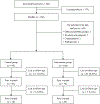A Technology-Based Educational Intervention and Multiple Domains of Symptom Experience: Asian American Breast Cancer Survivors
- PMID: 40372611
- PMCID: PMC12354248
- DOI: 10.1007/s13187-025-02648-5
A Technology-Based Educational Intervention and Multiple Domains of Symptom Experience: Asian American Breast Cancer Survivors
Abstract
Symptom management is one of the major concerns of cancer survivors, including Asian American breast cancer survivors (ABS) during their survivorship process. The purpose of this randomized intervention study was to determine the efficacy of a technology-based educational intervention in decreasing multiple domains of symptom experience among ABS. This was a part of a randomized clinical trial with repeated measures among 199 ABS recruited through online and offline groups/communities for Asian Americans. The intervention was a technology-based educational (information and coaching/support) program using computers and mobile devices to change health behaviors to improve the women's survivorship experience. The data were collected using multiple items on background and disease factors, and the Memorial Symptom Assessment Scale-Short Form (MSAS-SF). The data analysis was conducted using an intent-to-treat approach. Although the differences were not statistically significant, all multiple domain symptom scores of the intervention group decreased from pre-test to post 3 months, while only psychological symptom distress scores of the control group decreased from pre-test to post 3 months. Depending on the domain of symptoms, the significant mediators, with total, direct, or indirect effects, were different at different time points. For instance, attitudes, perceived barriers, social influences, social support, and self-efficacy showed significant total mediation effects on the total symptom distress scores only at pre-test (p < 0.05). The efficacy of a technology-based education intervention was supported in decreasing symptoms among ABS. Health educators need to consider that culturally tailored technology-based educational interventions could help improve the symptom experience of ABS.
Keywords: Asian Americans; Breast cancer; Cancer survivors; Education; Intervention; Symptom; Technology.
© 2025. The Author(s) under exclusive licence to American Association for Cancer Education.
Conflict of interest statement
Declarations. Conflict of interest: The authors declare no competing interests.
Similar articles
-
Prescription of Controlled Substances: Benefits and Risks.2025 Jul 6. In: StatPearls [Internet]. Treasure Island (FL): StatPearls Publishing; 2025 Jan–. 2025 Jul 6. In: StatPearls [Internet]. Treasure Island (FL): StatPearls Publishing; 2025 Jan–. PMID: 30726003 Free Books & Documents.
-
Nutritional interventions for survivors of childhood cancer.Cochrane Database Syst Rev. 2016 Aug 22;2016(8):CD009678. doi: 10.1002/14651858.CD009678.pub2. Cochrane Database Syst Rev. 2016. PMID: 27545902 Free PMC article.
-
Exercise interventions on health-related quality of life for people with cancer during active treatment.Cochrane Database Syst Rev. 2012 Aug 15;2012(8):CD008465. doi: 10.1002/14651858.CD008465.pub2. Cochrane Database Syst Rev. 2012. PMID: 22895974 Free PMC article.
-
Interventions for patients and caregivers to improve knowledge of sickle cell disease and recognition of its related complications.Cochrane Database Syst Rev. 2016 Oct 6;10(10):CD011175. doi: 10.1002/14651858.CD011175.pub2. Cochrane Database Syst Rev. 2016. PMID: 27711980 Free PMC article.
-
Specialist breast care nurses for support of women with breast cancer.Cochrane Database Syst Rev. 2021 Feb 3;2(2):CD005634. doi: 10.1002/14651858.CD005634.pub3. Cochrane Database Syst Rev. 2021. PMID: 34559420 Free PMC article.
References
-
- American Cancer Society. 2025. Breast cancer facts & figures. https://www.cancer.org/research/cancer-facts-statistics/breast-cancer-fa.... Accessed 23 April 2025
-
- Institute of Medicine. 2008. Challenges and successes in reducing health disparities: workshop summary. http://www.nap.edu/catalog.php?record_id=12154. Accessed 15 December 2013 - PubMed
-
- Lu Q, Chen L, Shin LJ, Wang C, Dawkins-Moultin L, Chu Q, Loh A, Young L, and Wang C. 2021. Improvement in quality of life and psychological well-being associated with a culturally based psychosocial intervention for Chinese American breast cancer survivors. Support Care Cancer 29(8):4565–4573. 10.1007/s00520-020-05942-8 - DOI - PMC - PubMed
Grants and funding
LinkOut - more resources
Full Text Sources


